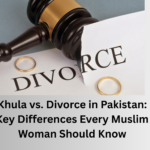
When a woman never asked khula, her entitlement to dower was safeguarded in a historic
Supreme Court verdict. Find out from the case what Pakistani divorce law’s lessons on women’s rights hold.
Saima’s Story:
Saima Khan produced. Sick of her husband, Ibrahim, and his relatives mistreating her, she brought her suffering to court. She sued in 2014 seeking divorce based on cruelty and claimed her legal rights: dowry, support, and child shelter.
But the twist came in here.
The court issued her khula, a form of Islamic separation typically requiring the lady to renounce her dower. For Saima, it meant losing half of a house. The drawback is that She never inquired for khula.
The High Court verified what she alleged when she contested the decision: her husband had already divorced her in front of the police and in a local jirga, or traditional assembly. That means khula was absolutely not necessary.
Eventually, the matter found its way to Pakistan’s Supreme Court, and there Saima finally heard justice knock on her door.
What the Supreme Court stated? An Evolution for Women’s Games
The highest court in Pakistan sent a strong message:
“Khula cannot be given until the woman herself asks for it. Courts cannot assume it or force it on her. She preserves her dower even if she is divorcing.
This indicates:
The court reinstated Saima’s claim to her share of the house, her dower.
It decided that it was unacceptable to provide khula without her permission.
It reminded every judge: respect the woman’s preferred legal remedy.
Why Every Woman Should Value This Judgment For women all across Pakistan, this is a wake-up call rather than only a legal triumph for Saima.
If you did not request khula, you need not forfeit your dower.
Courts have to value your precise legal claim—no presumptions.
Your rights remain strong should your husband file for divorce.
In your pleas, always be clear: whether it is cruelty or desertion, state so. Let no one turn it into
something else.
Common Questions (FAQs)
Q1: Can the court grant “khula” even if I exclude mentioning it in my case?
A: Not at all According to this Supreme Court decision, judges cannot mandate khula unless you
expressly ask for it and consent to forfeit your dower.
Q2: Should my husband have already filed for divorce?
A: Khula is not necessary at all. You preserve your legal rights—like your dower and
maintenance—if qualified; you are already divorced.
Q3: After separation, is my dowry still claimable?
A: Your dower is still yours as long as you did not waive it through khula.
Q4: Should the court mistake my claim, what would happen?
A: You are appealable. Higher courts will fix such mistakes, as this case illustrates.
Learn your words and own your rights.
Regarding Pakistani separation or divorce, every word in your petition counts. Saima’s story shows that the law is on your side—but only if you insist on what you are requesting.
So, walk in knowing if you are approaching a courtroom. You do not have to give up what is yours simply because someone mislabels your suffering.
https://www.supremecourt.gov.pk




